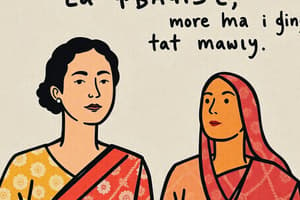Podcast
Questions and Answers
What is the primary concern highlighted regarding the belief in gender differences?
What is the primary concern highlighted regarding the belief in gender differences?
- It leads to societal injustice and suffering. (correct)
- It allows women to excel in traditionally male roles.
- It promotes equality in various fields.
- It creates a more diverse workplace.
How does the author describe the overlap of capabilities between genders?
How does the author describe the overlap of capabilities between genders?
- Men have a significant advantage in most fields.
- There is a high degree of overlap, with more differences within genders than between them. (correct)
- Women consistently outperform men in various domains.
- Capabilities are entirely determined by gender.
What does the author suggest regarding the term ‘guys’ when referring to women?
What does the author suggest regarding the term ‘guys’ when referring to women?
- It has evolved to include all humans irrespective of gender.
- Its usage reflects a societal misunderstanding of gender identity. (correct)
- It is a term that should not be used at all.
- It is universally accepted as a gender-neutral term.
What psychological concept does the author reference to describe the tendency to affirm existing beliefs about gender?
What psychological concept does the author reference to describe the tendency to affirm existing beliefs about gender?
What effect does the cultural messaging about gender differences have on societal perceptions?
What effect does the cultural messaging about gender differences have on societal perceptions?
What does the term 'guy' imply in the context of gender language discussed?
What does the term 'guy' imply in the context of gender language discussed?
What is a significant cultural issue related to calling women 'guys'?
What is a significant cultural issue related to calling women 'guys'?
Which phrase suggests a lack of appropriate terminology for women?
Which phrase suggests a lack of appropriate terminology for women?
What was noted about the self-esteem of adolescent girls?
What was noted about the self-esteem of adolescent girls?
What aspect of language is highlighted as deficient in the discussion?
What aspect of language is highlighted as deficient in the discussion?
Why might the term 'gals' be considered inappropriate for addressing men?
Why might the term 'gals' be considered inappropriate for addressing men?
How has the perception of women being referred to as 'guys' shifted over time?
How has the perception of women being referred to as 'guys' shifted over time?
What does the cultural phrase 'man up' signify in relation to gender discussions?
What does the cultural phrase 'man up' signify in relation to gender discussions?
What is the primary reason noted for the predominance of the term 'guys' in referring to mixed gender groups?
What is the primary reason noted for the predominance of the term 'guys' in referring to mixed gender groups?
What emotional impact does the use of gender-specific language have on individuals according to the discussion?
What emotional impact does the use of gender-specific language have on individuals according to the discussion?
What underlying implication does the term 'guys' carry when referring to women?
What underlying implication does the term 'guys' carry when referring to women?
How does the lack of a comparable term for women affect gender perceptions?
How does the lack of a comparable term for women affect gender perceptions?
What cultural phenomenon does the acceptance of 'guys' for mixed groups reflect?
What cultural phenomenon does the acceptance of 'guys' for mixed groups reflect?
What feelings might arise from women being referred to as 'guys' in mixed settings?
What feelings might arise from women being referred to as 'guys' in mixed settings?
Why may men not accept being called 'gals' while women are called 'guys'?
Why may men not accept being called 'gals' while women are called 'guys'?
In what way does the normalization of 'guys' in language impact self-esteem in women?
In what way does the normalization of 'guys' in language impact self-esteem in women?
What does the term 'mankind' reveal about gender representation in language?
What does the term 'mankind' reveal about gender representation in language?
What cultural implications arise from the absence of a gender-neutral pronoun in English?
What cultural implications arise from the absence of a gender-neutral pronoun in English?
How does the author's observation about mixed-gender groups challenge societal norms?
How does the author's observation about mixed-gender groups challenge societal norms?
What message does calling women 'guys' send about women's roles in society?
What message does calling women 'guys' send about women's roles in society?
Discuss how the concept of privilege contributes to the misconception of inherent gender differences.
Discuss how the concept of privilege contributes to the misconception of inherent gender differences.
Analyze the implications of calling women 'guys' in terms of gender identity and language.
Analyze the implications of calling women 'guys' in terms of gender identity and language.
Evaluate the role of confirmation bias in sustaining beliefs about gender roles as described by the author.
Evaluate the role of confirmation bias in sustaining beliefs about gender roles as described by the author.
Examine the thought experiments presented by the author and their significance in challenging gender assumptions.
Examine the thought experiments presented by the author and their significance in challenging gender assumptions.
Reflect on how cultural messaging around gender influences social interactions and self-perception.
Reflect on how cultural messaging around gender influences social interactions and self-perception.
Flashcards are hidden until you start studying
Study Notes
Gender Inequality and “Guys”
- Gender inequality is deeply ingrained in our society; it's a systemic issue that affects everything from household chores to political representation.
- Men are not inherently superior to women, but despite this, cultural messaging often reinforces the idea that men are the default standard for humanity.
- The term "guys" is a prime example of this: even when used among women, it reflects the ingrained societal belief that men are the norm and women are an afterthought.
- Using "guys" as a gender-neutral term perpetuates the erasure of women's identities and reinforces the idea that women are "less than" men.
The Psychological Impact of “Guys”
- The use of "guys" can contribute to women's low self-esteem.
- Studies show that girls are more likely than boys to feel self-conscious, embarrassed, and less confident, which can be tied to the lack of adequate recognition for their identities.
- There is a lack of gender-neutral pronouns in English, specifically for the second-person plural, which further contributes to the dominance of "guys" in group language.
- The language we use impacts our brains: social rejection, like the exclusion implied through the use of "guys," triggers the same brain response as physical pain, causing stress and impacting mental health.
Addressing the Issue
- It's important to recognize that using "guys" as a gender-neutral term isn't just a minor linguistic quirk, it's part of a larger system of exclusion that women face.
- It's time to actively challenge the use of "guys" and adopt more inclusive language.
- Simple changes, like saying "see you all later" instead of "see you guys later," can make a difference.
- By choosing more inclusive language, we can help create a more equitable world where women are seen, heard, and valued for who they truly are, not as a lesser version of men.
The Problem With Calling Women "Guys"
- The use of "guys" to refer to both men and women reinforces the idea that men are the standard and women are secondary.
- "Guys" is slang for boys or men, and there is no comparable term for women.
- Calling women "guys" can be seen as condescending or dismissive.
- Women are constantly called "guys," but men are not called "gals," highlighting a power imbalance.
- The use of "guys" to refer to mixed gender groups started becoming common in the 1980s, during a period of increased women's rights activism.
- This linguistic shift has contributed to women's lower self-esteem, as they are not recognized and included in a way men are.
- Social exclusion has negative effects on brain development, impacting self-esteem and psychological well-being.
- The practice of calling women "guys" is part of a larger system of gender inequality.
- The text encourages readers to adopt gender-neutral language that includes all people.
Studying That Suits You
Use AI to generate personalized quizzes and flashcards to suit your learning preferences.





